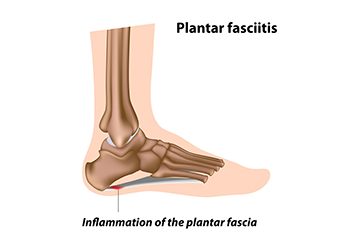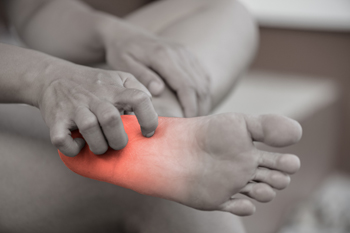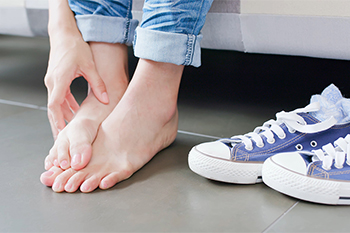Blog
Items filtered by date: December 2022
Tuesday, 27 December 2022 00:00
Reasons Why Plantar Fasciitis Can Develop

People who are afflicted with plantar fasciitis often have extreme heel pain. It is defined as a condition that affects the plantar fascia, which is the band of tissue that is found on the sole of the foot. Its function is to connect the heel to the toes and may become inflamed for various reasons. These can include standing on hard surfaces for the majority of the day or wearing shoes that do not fit correctly. Many patients have found mild relief when specific stretches are performed, in addition to wearing shoes that have adequate heel and arch support. Additionally, obesity may contribute to getting plantar fasciitis, and it is beneficial to lose weight which can help to reduce the pressure on the heels. If you have heel pain, please consult with a podiatrist as quickly as possible who can determine if the cause is plantar fasciitis, and treat it accordingly.
Plantar fasciitis is a common foot condition that is often caused by a strain injury. If you are experiencing heel pain or symptoms of plantar fasciitis, contact one of the podiatrists from JE Foot & Ankle Associates. Our doctors can provide the care you need to keep you pain-free and on your feet.
What Is Plantar Fasciitis?
Plantar fasciitis is one of the most common causes of heel pain. The plantar fascia is a ligament that connects your heel to the front of your foot. When this ligament becomes inflamed, plantar fasciitis is the result. If you have plantar fasciitis you will have a stabbing pain that usually occurs with your first steps in the morning. As the day progresses and you walk around more, this pain will start to disappear, but it will return after long periods of standing or sitting.
What Causes Plantar Fasciitis?
- Excessive running
- Having high arches in your feet
- Other foot issues such as flat feet
- Pregnancy (due to the sudden weight gain)
- Being on your feet very often
There are some risk factors that may make you more likely to develop plantar fasciitis compared to others. The condition most commonly affects adults between the ages of 40 and 60. It also tends to affect people who are obese because the extra pounds result in extra stress being placed on the plantar fascia.
Prevention
- Take good care of your feet – Wear shoes that have good arch support and heel cushioning.
- Maintain a healthy weight
- If you are a runner, alternate running with other sports that won’t cause heel pain
There are a variety of treatment options available for plantar fasciitis along with the pain that accompanies it. Additionally, physical therapy is a very important component in the treatment process. It is important that you meet with your podiatrist to determine which treatment option is best for you.
If you have any questions, please feel free to contact one of our offices located in Fleming Island and Palm Coast, FL . We offer the newest diagnostic and treatment technologies for all your foot care needs.
Tuesday, 20 December 2022 00:00
What Can Cause Neuropathy?

Peripheral neuropathy can cause a numbing and tingling sensation in the legs and feet. It is defined as nerve damage and it affects approximately half of diabetic patients. The nerves can become impaired as a result of elevated glucose and triglyceride levels that are found in the blood, which can lead to the small blood vessels that help to nourish the nerves being compromised. Common symptoms that are associated with neuropathy can include a burning, numbing, or tingling sensation in the feet and it is often difficult to walk. There may be a natural change in gait, or walking style, to compensate for these sensations. Balance may also be affected and the feet can appear swollen. It is helpful to learn about neuropathy prevention techniques, which can include monitoring glucose, cholesterol, and blood pressure levels. If you are afflicted with neuropathy, please consult with a podiatrist who can confirm this condition and guide you toward the correct treatment methods
Neuropathy
Neuropathy can be a potentially serious condition, especially if it is left undiagnosed. If you have any concerns that you may be experiencing nerve loss in your feet, consult with one of the podiatrists from JE Foot & Ankle Associates. Our doctors will assess your condition and provide you with quality foot and ankle treatment for neuropathy.
What Is Neuropathy?
Neuropathy is a condition that leads to damage to the nerves in the body. Peripheral neuropathy, or neuropathy that affects your peripheral nervous system, usually occurs in the feet. Neuropathy can be triggered by a number of different causes. Such causes include diabetes, infections, cancers, disorders, and toxic substances.
Symptoms of Neuropathy Include:
- Numbness
- Sensation loss
- Prickling and tingling sensations
- Throbbing, freezing, burning pains
- Muscle weakness
Those with diabetes are at serious risk due to being unable to feel an ulcer on their feet. Diabetics usually also suffer from poor blood circulation. This can lead to the wound not healing, infections occurring, and the limb may have to be amputated.
Treatment
To treat neuropathy in the foot, podiatrists will first diagnose the cause of the neuropathy. Figuring out the underlying cause of the neuropathy will allow the podiatrist to prescribe the best treatment, whether it be caused by diabetes, toxic substance exposure, infection, etc. If the nerve has not died, then it’s possible that sensation may be able to return to the foot.
Pain medication may be issued for pain. Electrical nerve stimulation can be used to stimulate nerves. If the neuropathy is caused from pressure on the nerves, then surgery may be necessary.
If you have any questions, please feel free to contact one of our offices located in Fleming Island and Palm Coast, FL . We offer the newest diagnostic and treatment technologies for all your foot care needs.
Tuesday, 13 December 2022 00:00
Athlete’s Foot in Teens
 Athlete’s foot is a fungal skin infection that thrives in damp, warm environments. It can cause annoying and uncomfortable redness, rashes, and flakiness between the toes and on the soles of the feet. This condition is contagious and can spread to other parts of the body or other people who encounter it. Athlete’s foot can affect people of all ages. Teens are a high-risk group because they are likely to participate in sports, walk barefoot in public places, and not be as careful about grooming their feet. Athlete’s foot usually goes away in a couple of weeks. However, treatment might be longer, especially if it becomes infected or impacts the toenails. Teens should be taught to keep their feet clean and dry, wear shoes in warm, wet public spaces, switch up which shoes are worn often to prevent moisture buildup, and change socks to ones made of material that wicks moisture away regularly. If your teen has athlete’s foot, it is suggested you take them to see a podiatrist who can treat it most effectively and efficiently.
Athlete’s foot is a fungal skin infection that thrives in damp, warm environments. It can cause annoying and uncomfortable redness, rashes, and flakiness between the toes and on the soles of the feet. This condition is contagious and can spread to other parts of the body or other people who encounter it. Athlete’s foot can affect people of all ages. Teens are a high-risk group because they are likely to participate in sports, walk barefoot in public places, and not be as careful about grooming their feet. Athlete’s foot usually goes away in a couple of weeks. However, treatment might be longer, especially if it becomes infected or impacts the toenails. Teens should be taught to keep their feet clean and dry, wear shoes in warm, wet public spaces, switch up which shoes are worn often to prevent moisture buildup, and change socks to ones made of material that wicks moisture away regularly. If your teen has athlete’s foot, it is suggested you take them to see a podiatrist who can treat it most effectively and efficiently.
Athlete’s foot is an inconvenient condition that can be easily reduced with the proper treatment. If you have any concerns about your feet and ankles, contact one of the podiatrists from JE Foot & Ankle Associates. Our doctors will treat your foot and ankle needs.
Athlete’s Foot: The Sole Story
Athlete's foot, also known as tinea pedis, can be an extremely contagious foot infection. It is commonly contracted in public changing areas and bathrooms, dormitory style living quarters, around locker rooms and public swimming pools, or anywhere your feet often come into contact with other people.
Solutions to Combat Athlete’s Foot
- Hydrate your feet by using lotion
- Exfoliate
- Buff off nails
- Use of anti-fungal products
- Examine your feet and visit your doctor if any suspicious blisters or cuts develop
Athlete’s foot can cause many irritating symptoms such as dry and flaking skin, itching, and redness. Some more severe symptoms can include bleeding and cracked skin, intense itching and burning, and even pain when walking. In the worst cases, Athlete’s foot can cause blistering as well. Speak to your podiatrist for a better understanding of the different causes of Athlete’s foot, as well as help in determining which treatment options are best for you.
If you have any questions please feel free to contact one of our offices located in Fleming Island and Palm Coast, FL . We offer the newest diagnostic and treatment technologies for all your foot and ankle needs.
Wednesday, 07 December 2022 00:00
Arthritis Can Cause Pain in the Feet and Ankles
Tuesday, 06 December 2022 00:00
Avoiding Injuries During Sports

Playing sports can be fun and help to keep your body fit, but these activities also may put you at risk of certain injuries. Many injuries incurred while playing a sport are unavoidable, but there are some things you can do to lower the chances of them happening. Stretching and warming up, for instance, is highly recommended before embarking on any strenuous exercise. It is also recommended by experts to listen to your body when it says it needs to rest, rather than pushing on through the pain or fatigue. This can help to avoid strains, sprains, stress fractures, or overuse injuries. Further, to help keep injuries at bay it is suggested to wear any necessary protective gear and footwear specifically designed for that sport. Keeping hydrated before, during, and after sports activity is also desirable. Finally, if you get hurt while playing a sport, stop the activity immediately and rest. Injuries to the Achilles tendon, ankle joint, feet, and muscles will only become worse, and possibly chronic if ignored. It is wise to see a podiatrist if such an injury occurs for a proper diagnosis and treatment plan.
Ankle and foot injuries are common among athletes and in many sports. They can be caused by several problems and may be potentially serious. If you are feeling pain or think you were injured in a sporting event or when exercising, consult with one of the podiatrists from JE Foot & Ankle Associates. Our doctors will assess your condition and provide you with quality foot and ankle treatment.
Common Injuries
The most common injuries that occur in sporting activities include:
- Achilles Tendonitis
- Achilles Tendon Rupture
- Ankle Sprains
- Broken Foot
- Plantar Fasciitis
- Stress Fractures
- Turf Toe
Symptoms
Symptoms vary depending upon the injury and in some cases, there may be no symptoms at all. However, in most cases, some form of symptom is experienced. Pain, aching, burning, bruising, tenderness, tightness or stiffness, sensation loss, difficulty moving, and swelling are the most common symptoms.
Treatment
Just as symptoms vary depending upon the injury, so do treatment options. A common treatment method is known as the RICE method. This method involves rest, applying ice, compression and elevating the afflicted foot or ankle. If the injury appears to be more serious, surgery might be required, such as arthroscopic or reconstructive surgery. Lastly, rehabilitation or therapy might be needed to gain full functionality in the afflicted area. Any discomfort experienced by an athlete must be evaluated by a licensed, reputable medical professional.
If you have any questions, please feel free to contact one of our offices located in Fleming Island and Palm Coast, FL . We offer the newest diagnostic and treatment technologies for all your foot care needs.
Blog Archives
- May 2025
- April 2025
- March 2025
- February 2025
- January 2025
- December 2024
- November 2024
- October 2024
- September 2024
- August 2024
- July 2024
- June 2024
- May 2024
- April 2024
- March 2024
- February 2024
- January 2024
- December 2023
- November 2023
- October 2023
- September 2023
- August 2023
- July 2023
- June 2023
- May 2023
- April 2023
- March 2023
- February 2023
- January 2023
- December 2022
- November 2022
- October 2022
- September 2022
- August 2022
- July 2022
- June 2022
- May 2022
- April 2022
- March 2022
- February 2022
- January 2022
- December 2021
- November 2021
- October 2021
- September 2021
- August 2021
- July 2021
- June 2021
- May 2021
- April 2021
- March 2021
- February 2021
- January 2021
- December 2020
- November 2020
- October 2020
- September 2020
- August 2020
- July 2020
- June 2020
- May 2020
- April 2020
- March 2020
- February 2020
- January 2020
- December 2019
- November 2019
- October 2019
- September 2019

